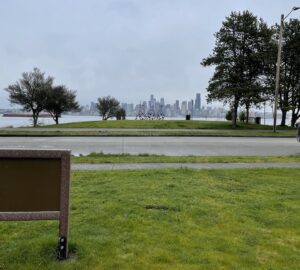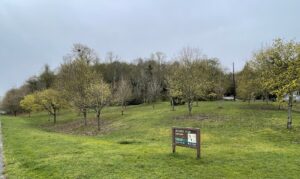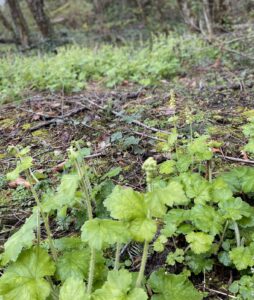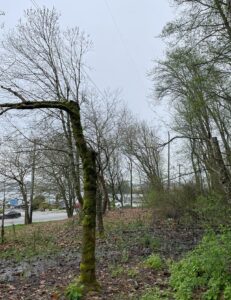Heading North: Introducing our new restoration site
Just in time for April’s Earth Month, Delridge Neighborhoods Development Association’s (DNDA) Nature team is expanding our reach northward to a new forest restoration site in the Duwamish Head Greenbelt!
Through DNDA’s long-term relationship with the Green Seattle Partnership, our team will be starting restoration work at a site near Seacrest Park in the Fairmount Gulch area of West Seattle this month. The site makes us excited to host a larger footprint of various group events and individual volunteers throughout the year.

Come for the forest restoration, stay for the downtown views looking north from our new site at Duwamish Head Greenbelt.
One of DNDA’s goals is to empower community members to take care of their local land, especially in areas that have been neglected for many years. This site — which, for lack of a more creative term, we’ll be calling “Duwamish Head” — has been tended to by groundskeepers from the city parks department, but has not been an official community stewardship site until today.
Our Nature team plans to focus early efforts on maintaining the health and longevity of the trees at the front of the site, where their main competition is a field of non-native turf grass. Despite their comparatively tiny stature, grasses are a vigorous competitor with trees for access to soil nutrients and, crucially, water. Our staff and volunteers will spread wood chip mulch around the base of the trees to suppress the grasses and help retain soil moisture during the summer.
In the long term, our Nature team hopes the site can eventually be managed in a way that improves the ecological value of its grassland. This may involve reduced mowing and increased introduction of native grasses and wildflowers into the plant community. Both of these approaches have long been recognized as more ecologically sound than conventional lawn care methods.
Deep into the site, the Nature team will work to control invasive plant species — primarily blackberry, ivy, and herb Robert. These invasive plants are prevalent in many of the parks and greenspaces in Seattle, and they cause ongoing challenges to ecosystems.
Many invasive species have quick growth rates, produce lots of seeds, and tolerate a wide range of climates and soil types. This leads them to taking over ecosystems, severely limiting biodiversity and the health of the forest.
After invasive plants are removed at Duwamish Head, our team will install native ground cover plants to replace them, marking the beginning of re-establishing shrubs.
At many of our restoration sites, we focus on establishing large, strong canopy trees over time. Trees are critical for lowering temperatures and reducing the local impacts of our warming climate. However, there are also non-ecological considerations when it comes to managing large trees in an urban environment.
In this case, overhead utility lines run through Duwamish Head, and they cause conflicts with large trees when branches fall onto the lines. One potential solution our team will explore at the site is focusing on planting smaller native trees such as cascara, shore pine, and yew.
We hope you found this walkthrough informative and, perhaps, an enticement to get out and join us! Sign up to help us restore local urban forest sites across West Seattle — including north now — at dnda.org/nature. Help us restore Duwamish Head at our next volunteer event on Saturday, June 8.
— Written by DNDA Restoration Program Manager Ben Antonius



